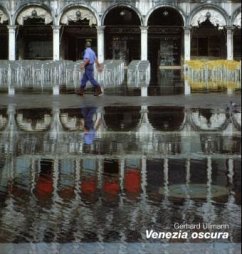We could find a great deal to say about masks and concealment when leafing through Gerhard Ullmann's photographs. Half of Venice is masked, stuck over with posters or covered with paintings, so convincingly that with some of the pictures by Ullmann you don't know whether you are seeing the reality or just the pictures overlapping it. But in fact it is just like the old Venetian half-masks, where the face shows through at some point - and above all it is keeping a sharp and watchful eye on us, the strangers. These pasted images are like the old masks, they are evil or sad, the last thing they are is amusing. We are aware of the decay that is being hidden here, the flaking
decorations that would reappear if the area under the paper were cleaned. Is Venice decaying? No other city flaunts its decline as much as Venice, and perhaps the papering has something to be said for it because it makes us wonder whether there might be something beautiful under there, a carved sla b or an inscription. John Ruskin responded to the signals of decay by writing his book about Venice, which was supposed to ensure that there was at least a record of the city after it disappeared. A postcard written by his young wife to her parents has survived; she writes: "John has gone into a church to draw it, at least while it is still standing." So for the author of "The Stones of Venice" the masking was simply grounds for mourning. He did not understand what else it had to offer. - Here we have to add a sentence by Leon Battista Alberti: "Io scrissi queste cose ridendo, voi ancora ridete."
Gerhard Ullmann was born in Teplitz in 1935, and has lived in Berlin since 1956, where he studied architecture and painting at the Hochschule der Künste, then worked as an architecture and art critic, and also as a photographer. His work includes books on Sanssouci and derelict industrial sites. He has also acquired a reputation abroad with his photographic exhibitions on Berli n and Venice, on masks and carnivals. Lucius Burckhardt, a young don at HfG Ulm and ETH Zurich, later editor-in-chief of the magazine werk, professor at the Gesamthochschule Kassel from 1973 to 1997, in the meantime chairman of the Deutscher Werkbund, is indubitably one of the most unusual "lateral" thinkers of our day.
decorations that would reappear if the area under the paper were cleaned. Is Venice decaying? No other city flaunts its decline as much as Venice, and perhaps the papering has something to be said for it because it makes us wonder whether there might be something beautiful under there, a carved sla b or an inscription. John Ruskin responded to the signals of decay by writing his book about Venice, which was supposed to ensure that there was at least a record of the city after it disappeared. A postcard written by his young wife to her parents has survived; she writes: "John has gone into a church to draw it, at least while it is still standing." So for the author of "The Stones of Venice" the masking was simply grounds for mourning. He did not understand what else it had to offer. - Here we have to add a sentence by Leon Battista Alberti: "Io scrissi queste cose ridendo, voi ancora ridete."
Gerhard Ullmann was born in Teplitz in 1935, and has lived in Berlin since 1956, where he studied architecture and painting at the Hochschule der Künste, then worked as an architecture and art critic, and also as a photographer. His work includes books on Sanssouci and derelict industrial sites. He has also acquired a reputation abroad with his photographic exhibitions on Berli n and Venice, on masks and carnivals. Lucius Burckhardt, a young don at HfG Ulm and ETH Zurich, later editor-in-chief of the magazine werk, professor at the Gesamthochschule Kassel from 1973 to 1997, in the meantime chairman of the Deutscher Werkbund, is indubitably one of the most unusual "lateral" thinkers of our day.
Perlentaucher-Notiz zur Süddeutsche Zeitung-Rezension
Der mit "G.K." zeichnende Rezensent zeigt sich sehr beeindruckt von Gerhard Ullmann Fotoband. Er kennzeichnet Ullmanns Fotografie eingangs als "obsessiv auf das Fundstück gerichtete, fast wissenschaftliche Art der Feldforschung". Seine Farbaufnahmen eines "venezia obscura" gehen laut Rezensent weit über die touristische Neugier hinaus. Der Rezensent hebt vor allem Ullmanns beiläufige Entdeckungen und formal "verblüffenden" Beschreibungen "sprechender Nebenmotive" hervor, mit denen Ullmann tief in das Geheimnis der Stadt eindringt. Über die Beschreibung von Ullmanns Bildern, etwa von den "bemalten, beklebten oder zerkratzten Hauswänden", den "im Nebel oder im Schnee verlöschenden architektonischen Strukturen" oder den "malerisch weichen Abstraktionen der Farbspiele im Wasser der Kanäle", gerät der Rezensent regelrecht ins Schwärmen.
© Perlentaucher Medien GmbH
© Perlentaucher Medien GmbH

